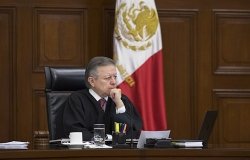African Development: Opportunities and Challenges
His Excellency Yoweri Museveni, president of Uganda. Click here for the President's remarks.
Overview
In his introductory remarks, Wilson Center Public Policy Scholar Howard Wolpe lauded Uganda's political and economic recovery of the past 16 years under President Museveni's leadership. Though still a poor country, Uganda has experienced steady economic growth annually. Though Uganda has no multiparty political system, it boasts an independent, privately owned media and open political discourse. Wolpe noted that Uganda has been a model country for curtailing the spread of HIV/AIDS—one of only two African nations (Senegal being the other) with a declining AIDS rate.
Museveni had come to Washington seeking U.S. partnerships and investments, building on the cooperation generated from the African Growth and Opportunities Act enacted by Congress two years ago.
He commended the increased solidarity between Uganda and the United States on such issues as trade, investment, conflict resolution, and the fight against HIV/AIDS.
Museveni supports such initiatives for regional economic integration as the East African Community (EAC), Common Market of East and Southern Africa (COMESA) and the New Partnership for Africa's Development (NEPAD) as vehicles to promote inter-regional and international trade. Museveni emphasized trade, specifically access to markets, as a remedy for the poor standard of living that prevails in parts of Africa today. "The song about aid is meaningless without access to markets." He urged an end to protectionism, opposing subsidies to farmers. How can the rich maintain subsidies, he asked, when the poor cannot? "Our farmers can compete on their own, and I don't want to subsidize them," he said.
Museveni urges the countries of the world to open up their markets, quota and tariff free, to encourage multinational investment in Africa. He said that African leaders have removed some of the former impediments to private investment. He added that some African countries have a consistently stable macro-economic framework. Africa's currencies are now convertible, African infrastructure is "reasonable," and democracy is widely practiced.
To date, many formerly colonized peoples of the world have significantly improved their status, yet many still live in appalling conditions. Museveni maintained that open access to world markets would allow Africans to be part of a global village motivated by symbiosis, not parasitism. "Empower Africans, not for the sake of empowering them out of a sense of philanthropy," he said. "Think strategically and create markets for American goods!"
Museveni then turned to other issues of global concern. Museveni said that effective leadership could overcome the scourge of HIV/AIDS in Africa. Uganda had implemented a campaign against HIV/AIDS to raise awareness, increase prevention, and provide treatment, via the partnering of the government with grassroots entities. "In 10 years, we have reduced the rate of infection from 30 percent to 6.1 percent," he said.
Museveni also discussed conflict resolution on the African continent. He said that the conflicts in Congo, Burundi, and Sudan all have seen progress toward negotiated political settlements. In addition, he emphasized that all of Africa has a responsibility in the global campaign against terrorism and said that African leaders are committed to this effort.
Drafted by Dana Steinberg
Documents & Downloads
Hosted By

Africa Program
The Africa Program works to address the most critical issues facing Africa and US-Africa relations, build mutually beneficial US-Africa relations, and enhance knowledge and understanding about Africa in the United States. The Program achieves its mission through in-depth research and analyses, public discussion, working groups, and briefings that bring together policymakers, practitioners, and subject matter experts to analyze and offer practical options for tackling key challenges in Africa and in US-Africa relations. Read more
Thank you for your interest in this event. Please send any feedback or questions to our Events staff.









